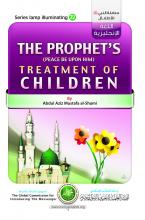The Prophet of Mercy Website
Muslim World League - Global Commission for Introducing the Messenger
His Rights
This story spoke of one journey – at least – before Ishmael became a young man. Al-Bukhari, on
the authority of Ibn ‘Abbas, reported the other three journeys; a summary of which goes as follows:
When Ishmael became a young man, he learned Arabic at the hand of the tribe of Jurhum, who
loved him with great admiration and gave him one of their women as a wife, soon after his mother
died. Having wanted to see his wife and son again, Abraham came to Makkah, Ishmael’s marriage,
Abraham returned to Palestine where Hagar gave birth to Ishmael. Sarah became so jealous of
Hagar that she forced Abraham to send Hagar and her baby away to a plantless valley on a small
hill in Hijaz, by the Sacred House, exposed to the wearing of floods coming right and left. He chose
for them a place under a lofty tree above Zamzam near the upper side of the Mosque in Makkah
where neither people nor water was available, and went back to Palestine leaving with his wife and
1. Azd: Who, under the leadership of ‘Imran bin ‘Amr Muzaiqbâ’, wandered in Yemen, sent
pioneers and finally headed northwards. Details of their emigration can be summed up as
follows:
8
2. Tha‘labah bin ‘Amr left his tribe Al-Azd for Hijaz and dwelt between Tha‘labiyah and Dhi Qar.
When he gained strength, he headed for Madinah where he stayed. Of his seed are Aws and
Khazraj, sons of Haritha bin Tha‘labah.
Haritha bin ‘Amr, known as Khuza‘a, wandered with his folks in Hijaz until they came to Mar
When talking about the Arabs before Islam,we deem it necessary to draw a mini-picture of the
history of rulership, princeship, sectarianism and the religious dominations of the Arabs, so as to
facilitate the understanding of emergent circumstances when Islam appeared.
When the sun of Islam rose, rulers of Arabia were of two kinds: crowned kings, who were in fact not
independent; and heads of tribes and clans, who enjoyed the same authorities and privileges
possessed by crowned kings and were mostly independent, though some of whom could have shown
The folks of Sheba were one of the oldest nations of the pure Arabs, who lived in Yemen.
Excavations at “Or” brought to light their existence twenty five centuries B.C. Their civilization
flourished, and their domain spread eleven centuries B.C.
It is possible to divide their ages according to the following estimation:
1. The centuries before 650 B.C., during which their kings were called “Makrib Sheba”. Their
capital was “Sarwah”, also known as “Khriba”, whose ruins lie in a spot, a day’s walk from
Ever since Korosh the Great (557-529 B.C.) united the Persians, they ruled Iraq and its
neighbourhood. Nobody could shake off their authority until Alexander the Great vanquished their
king Dara I and thus subdued the Persians in 326 B.C. Persian lands were thenceforth divided and
ruled by kings known as “the Kings of Sects”, an era which lasted until 230 A.D. Meanwhile, the
Qahtanians occupied some Iraqi territories, and were later followed by some ‘Adnanians who
managed to share some parts of Mesopotamia with them.
No sooner did Kisra Anu Shairwan succeed Qabaz than he, due to hatred of Mazdak’s philosophy,
killed Mazdak and many of his followers, restored Munzir to the throne of Heerah and gave orders to
summon under arrest Harith who sought refuge with Al-Kalb tribe where he spent the rest of his life.
Sons of Al-Munzir bin Ma’ As-Sama’ maintained kingship a long time until An-Nu‘man bin Al-Munzir
took over. Because of a calumny borne by Zaid bin ‘Adi Al-‘Abbadi, the Persian king got angry with
In the process of the tribal emigrations, some septs of Quda‘a reached the borders of Syria where
they settled down. They belonged to the family of Sulaih bin Halwan, of whose offspring were the
sons of Duj‘am bin Sulaih known as Ad-Duja‘ima. Such septs of Quda‘a were used by the
Byzantines
in the defence of the Byzantine borders against both Arab Bedouin raiders and the Persians, and
enjoyed autonomy for a considerable phase of time which is said to have lasted for the whole
Ishmael (Peace be upon him) administered authority over Makkah as well as custodianship of the
Holy Sanctuary throughout his lifetime. Upon his death, at the age of 137, two of his sons, Nabet
and Qidar, succeeded him. Later on, their maternal grandfather, Mudad bin ‘Amr Al-Jurhumi took
over, thus transferring rulership over Makkah to the tribe of Jurhum, preserving a venerable
position, though very little authority for Ishmael’s sons due to their father’s exploits in building the
‘Amr bin Al-Harith bin Mudad Al-Jurhumi was reported by Ibn Ishaq, the wellknown
historian, to have buried the two gold deer together with the Black Stone as well as a lot of
jewelry and swords in Zamzam, prior to their sorrowful escape to Yemen.
Ishmael’s epoch is estimated to have lasted for twenty centuries B.C., which means that Jurhum
stayed in Makkah for twenty-one centuries and held rulership there for about twenty centuries.
Upon defeat of Jurhum, the tribe of Khuza‘a monopolized rulership over Makkah. Mudar tribes,







